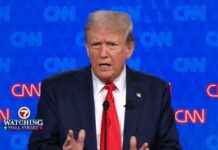Former President Donald Trump recently made headlines by stating that he would use his presidential powers to fire Special Counsel Jack Smith, who has been investigating him for multiple criminal charges. Trump made these comments during an interview with conservative radio host Hugh Hewitt, where he confidently stated that he would dismiss Smith within two seconds if given the chance.
Jack Smith was appointed by Attorney General Merrick Garland to oversee investigations into Trump’s alleged efforts to overturn the 2020 election results and mishandling of classified documents. While the classified documents case was dismissed by a federal judge, Smith is still pursuing charges against Trump for election subversion. These charges include conspiracy to defraud the United States, obstruction of an official proceeding, and conspiracy against rights.
If Trump were to fire Smith, it would potentially allow the Department of Justice to drop the charges against him and end the ongoing court cases. Trump, who has faced legal troubles in a separate New York case, has continuously claimed that the justice system is being used against him unfairly due to his political aspirations. He has even hinted at using the justice system to target his political rivals if he were to be reelected.
This is not the first time Trump has suggested firing Smith, as he previously mentioned in a Breitbart interview that he would not keep the Special Counsel if reelected. Trump has been vocal about his intentions to use the justice system to pursue his political opponents, including President Joe Biden and his family. He has labeled his opponents as “the enemy from within” and has even discussed using the military to handle potential chaos on Election Day.
Vice President Kamala Harris has criticized Trump’s comments, calling him “unstable” and “unhinged” as he seeks unchecked power. The former president’s aggressive stance towards his political rivals and the justice system has raised concerns among various stakeholders.
As the legal battle between Trump and Special Counsel Jack Smith unfolds, the implications of Trump’s actions could have far-reaching consequences for the justice system and the political landscape. The ongoing power struggle between the former president and the legal system highlights the challenges of maintaining accountability and transparency in a highly polarized political environment.
















